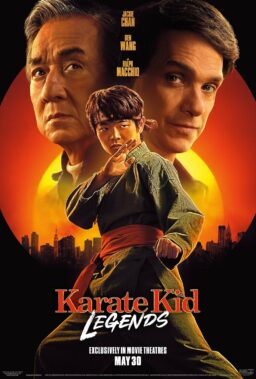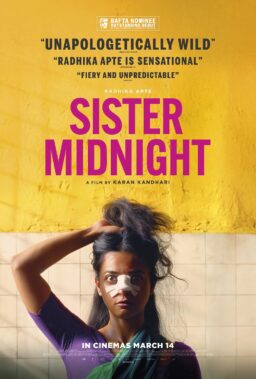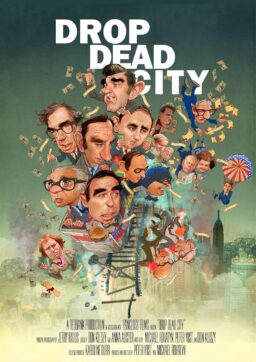Read Roger Ebert’s essay on certain critics’ reactions to “Million Dollar Baby.”
For more information on the controversies over “Million Dollar Baby,” please see the related articles section in the left column. We also recommend Jeff Shannon’s pieces for New Mobility Magazine:
Maggie, Frankie, and Me
Interview with Eastwood
(clicking on these links will open a new browser window)
How does a carefully crafted specimen of classical American moviemaking like Clint Eastwood’s “Million Dollar Baby,” an old-fashioned boxing movie/tearjerker that (except for some language and realistic cut-and-bruise makeup) might well have been made in the Hollywood of the 1940s, become a “controversial” political hot potato in 2005? When various media mouthpieces and “special interest groups” seize upon it as a publicity tool to further their own agendas, that’s how.
* If you haven’t seen “Million Dollar Baby,” or don’t want to know what happens in it, stop reading now.*
First let me say this, as a movie critic who admires “Million Dollar Baby” but thinks it suffers from occasional glaring lapses in tone and logic: A movie is about what happens to you while you watch it. If what’s on the screen prompts you to ask yourself questions during the movie – and afterwards – then you should keep those questions in mind when thinking back on how the movie works and how it affected you. A movie is a shared experience, and the questions it raises (whether the filmmakers intended to raise them or not) are an essential part of that experience.
Yes, movies are invariably political; they are products and reflections of the time and place in which they are made and released. But they’re also movies — open to interpretations, implications, and ambiguities beyond those of ideological reductionists, even beyond the stated intentions of the filmmakers themselves. What’s there on the screen is there – and people will see and respond depending on their individual sensibilities. More about that in a few paragraphs….
* * *
That professional “opinionators” like Michael Medved (promoting his latest anti-Hollywood book) and Rush Limbaugh have chosen to exploit the high profile of “Million Dollar Baby” to advance their own “pro-life” positions should come as no surprise. These guys are partisan opportunists, not movie critics, and assuming loud and outraged positions is how they make their living. What do you expect?
To them and other right-wing commandos, the assisted suicide in “Million Dollar Baby” must seem like another Hollywood mind-control conspiracy of the kind movie-reviewer-turned-pundit Medved likes to fantasize about in his books – a way of sneaking a near-subliminal “anti-life” (or pro-choice) message into audiences’ unsuspecting heads.
And it’s the abortion issue, not necessarily assisted suicide, that I think they’re really howling about in their pre-emptive attacks on “Million Dollar Baby.” I’m just waiting for someone to claim the whole movie is an insidious cinematic plot to metaphorically promote pro-choice views, citing as evidence the word “Baby” in the title.
The movie shows two tortured characters – boxer Maggie Fitzgerald (Hilary Swank) and her trainer/surrogate father Frankie Dunn (Clint Eastwood) – facing a devastating moral and emotional dilemma, when Maggie is paralyzed in the ring and asks Frankie to help her die.
Never mind that Frankie initially refuses and tries to talk her out of it; once she’s made up her mind, we know that Frankie is bound to honor her request. But Maggie’s choice does not square with the Medved/Limbaugh conservative party line, which is “pro-life,” pro-Judeo-Christian religion, pro-death penalty, and anti-assisted suicide. (Remember anti-abortion, pro-capital punishment Evangelical Attorney General John Ashcroft, a longtime proponent of Federalism and states’ rights, who nevertheless went to court to try to stop Oregon’s voter-approved assisted suicide law.)
For them, death can only be seen as a moral judgment, imposed by society (or God) as a punishment – no individual can be allowed the right to choose death under any circumstances, even for himself or a member of his family. Of course, the protagonist of Mel Gibson’s “The Passion of the Christ,” a movie they greatly admire, is an assisted suicide, too; nobody would be making a movie about him 2000 years later if Jesus hadn’t chosen to die as a willing sacrifice. But it can be said he was acting on higher authority, and all the assisting characters in Gibson’s movie — from the Romans to the Jews, Judas to Jesus — are just following divine orders, whether they know it or not.
This attitude toward death as a moral/dramatic judgment device reminds me of the days of the Hollywood Production Code, when no bad deed could go unpunished. It was OK to show killing – whether murder or accidental homicide or manslaughter – but the guilty had to be penalized for their sins, no matter how shaded or nuanced that guilt might be. It wasn’t until Fritz Lang’s “Scarlet Street” in 1945 that a character was allowed to “get away with murder”; the wrong man is executed for a crime (but he’s a bad guy anyway), and the guilty man, driven insane over what he has done, tries to kill himself, fails, and is left in agony, tormented by voices reminding him of his crimes.
Is that kind of thing a little too psychologically demanding for 2005?
Wizened, skeptical Frankie is shown as a man who says his prayers and goes to mass every day – if only to torment the priest with insubordinate questions about church doctrine. In the end, the ineffectual clergyman has nothing to offer Frankie in his time of need but the suggestion that he “step aside” and let God take over, warning that: “If you do this thing you will be lost, somewhere so deep you will never find yourself.” To me, this shows the impotence of the priest’s by-the-book dogma in the face of the tragedy and complexity of life as it is actually lived beyond the walls of the ivory-tower church. (It also shows he doesn’t know his troublesome parishioner Frankie very well after all these years; you don’t tell an old fighter like Frankie to give up, duck, or step out of the way, in a situation as dire as this.)
But Roger Ebert, in his review, interprets this scene quite differently: “Eastwood is attentive to supporting characters, who make the surrounding world seem more real. The most unexpected is a Catholic priest who is seen, simply, as a good man; movies all seem to put a negative spin on the clergy these days. Frankie goes to mass every morning and says his prayers every night, and Father Horvak (Brian F. O'Byrne) observes that anyone who attends daily mass for 23 years tends to be carrying a lot of guilt. Frankie turns to him for advice at a crucial point, and the priest doesn’t respond with church orthodoxy but with a wise insight…”
And Ty Burr of the Boston Globe sees it this way: “’Million Dollar Baby’ ultimately emerges into a cold light far from the bromides and consolations of Hollywood: What begins as a lark ends as a meditation on the costs of faith. You may carry this movie with you for quite some time, turning over its unspoken meanings. It’s a film that rejects the church for the parishioners, that walks away from God and toward people, and that unexpectedly ascends to a battered, anonymous grace.”
This cannot sit well with religious activists like Medved. In addition to appearing on television (CNN, “The 700 Club”) to badmouth the movie’s alleged hidden messages, Medved slipped his “Million Dollar Baby” spoiler into an article about how the Oscar nominations for “The Passion of Christ” (the political agenda movie of this time last year) demonstrated “Hollywood’s profound, almost pathological discomfort with the traditional religiosity embraced by most of its mass audience.”
Aside: It does not occur to Medved that, perhaps, a phenomenally successful movie made by an established movie star but financed, produced, distributed and marketed entirely outside the Hollywood film industry, might not necessarily be the sort of thing that LA/New York-based insiders such as Academy voters, who rely on the mainstream movie industry for their employment, would be inclined to reward with their Oscars. The Academy Awards were started by the studios as a publicity gimmick — and a way to keep demanding stars in line by appealing to their egos. They’re supposed to be honors granted by the nominees’ showbiz “peers” – not ways of encouraging rebels to circumvent the system. You might as well demand an Independent Spirit Awards nomination for “Titanic.”
* * *
Advocacy groups for the disabled are coming at “Million Dollar Baby” from a slightly different angle. In addition to claiming the movie takes a morally indefensible “better dead than disabled” position, some say that Eastwood himself is carrying out a “vendetta” against the Americans With Disabilities Act (ADA) because of a lawsuit brought against him in 1997 over accessibility accommodations that needed to be made at a hotel Eastwood owns. Eastwood won the suit, but was found in violation of the ADA, and he backed a provision that would require a 90-day notice for property owners before they could be sued under the ADA.
“I’m saddened but not surprised that [Eastwood] uses the power of fame and film to perpetuate his view that the lives of people with disabilities are not worth living,” said Marcie Roth, CEO of the National Spinal Cord Injury Association, in a press release.
And Steve Drake of Not Dead Yet wrote a detailed review of the film that included suggestions for what like-minded readers could do to protest the film. Among them: “…there’s always the option of audibly saying ‘bulls—t’ and similar things at particularly absurd or offensive points while you’re watching the movie. It’s rude, but trying to focus on the sentimentalized killing of a disabled person while another disabled person is escorted out of the theater would make a unique viewing experience for the audience.”
I appreciate the point of view of these activists, but they are grossly oversimplifying the movie — even at the level of its crudest cliches. Does the movie really impose such a clear, strong statement on its characters? Or is it a story about individuals making terrible, difficult, dramatic choices that are not so clear-cut — and the consequences of those hard choices? Does anybody honestly think “Million Dollar Baby” — faults and all — can be reduced to the equivalent of a political tract handed out on a streetcorner? If it were truly Eastwood’s intention to lash out at the disabled, surely he would have been able to further his alleged grudge a lot more effectively than by making this particular movie.
* * *
I have a theory about the reactions to “Million Dollar Baby,” which boils down to this: A person’s response to the assisted suicide largely depends on whether the movie is seen as being primarily Frankie’s story or primarily Maggie’s story.
Everything about the movie pretty much tells you how it will end, from its dark and brooding visuals to its lean, symmetrical structure to its spare and haunting musical score (by Eastwood himself). Anyone who has seen “Unforgiven” and “Mystic River” knows that Eastwood does not make feel-good pictures but moody meditations on morality and mortality.
In “Million Dollar Baby,” anyone familiar with the American tradition of classical storytelling will probably see where the movie’s going early on, if not from the introduction of the “lost daughter” motif (Frankie’s letters to his daughter keep coming back) then from the dog story Maggie tells in the second act. There’s a reason Eastwood holds on the image of the little girl and her dog at the gas station (that little girl is named Morgan Eastwood, by the way), and there’s a reason they’re seen through the frame of one vehicle window while Maggie is seen looking at them through the frame of another. This privileged moment is a glimpse of happiness that Maggie is not going to share. It is an omen, and the inspiration for her to tell Frankie about her memories of her father and his dog.
So, ask yourself: Is this the story of a man who loses one daughter, finds a surrogate daughter, and loses her too? Or is it the story of a young woman who escapes her toxic redneck family, finds a father-figure who helps her achieve her dreams, suffers a fate-dealt blow that lays waste to those dreams, and is then forced to ask that beloved father to prove his love by helping her die – even though she knows it will destroy him as well? Or is it both? Or something else?
While I was watching the last section of the movie, even though I knew from its structure where it had to be headed, I kept asking myself about Maggie’s character: Is she a tenacious enough fighter to stay in the ring – knowing that Frankie loves her and would devote himself to her care? Or is she so independent-minded that she must reject that kind of love from Frankie, and ask that he release them both from their mutual burden? Or is she capable of growing and maturing enough to be able to accept love from Frankie, even if it means dependence? How would another ending change the movie’s themes, or would it? I still don’t have all my own answers to those questions.
While watching “Million Dollar Baby,” I kept thinking of the great American director Howard Hawks (“Rio Bravo,” “Red River,” “Only Angels Have Wings,” “His Girl Friday, “To Have and Have Not”), whose films celebrated proud independent-minded individuals, damaged in various ways by their experiences in life, who come together to form a community and function as a glorious whole. Hawks, who was also a friend of Ernest Hemingway, worked in the lean, tough, no-nonsense Hemingway tradition – as did F.X. Toole, the author of the stories on which “Million Dollar Baby” is based, and whose prose is as spare and clean as Hemingway’s.
In some respects, “Million Dollar Baby” embraces those Hawks/Hemingway values, at least up through the final boxing match. And, in the end, it can be argued that the movie rejects them as too simple and naïve — idealistic pipe dreams that can’t survive for long in the harsh and indifferent real world. But that is something for movie critics, and moviegoers, to discuss and debate. It’s not something that can be reduced to a simple prescription for life or death by chattering heads on TV or radio shows, hawking their political patent medicines.











